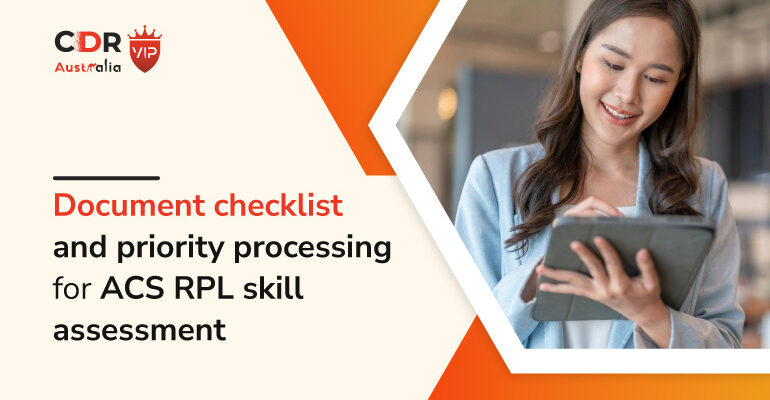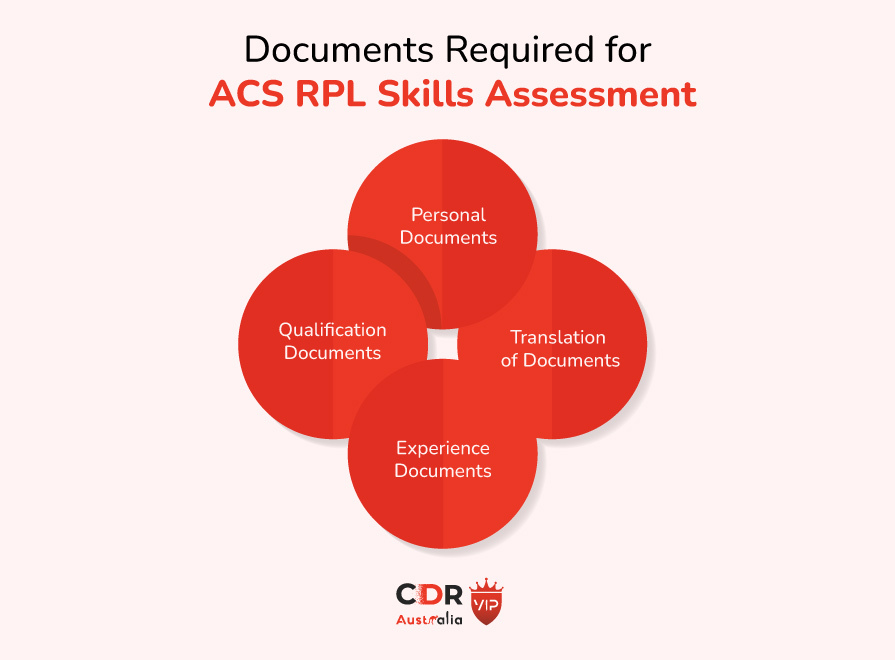ACS RPL Skills Assessment: Checklist & Priority Processing

ACS RPL Skills Assessment: Checklist & Priority Processing
Australia is excellent for Information and Communication Technology (ICT) professionals. It has a thriving tech scene and a good quality of life. But if you don’t have formal ICT qualifications, you need to take a significant step: the ACS RPL Skills Assessment.
To work in Australia’s tech field, you must pass an ACS RPL skills assessment from the Australian Computer Society (ACS). The Australian Ministry of Immigration has appointed the ACS to test skilled engineers for jobs in ICT.
If you’re a skilled ICT professional, the ACS looks for applicants in ICT fields through skill assessments. They want to find people with the right skills, knowledge, and capabilities for migration to Australia. Even if you don’t have an ICT background, you can take the Skill Assessment Test administered by ACS. Follow their guidelines and submit RPL reports.
When writing RPL reports, you must choose ANZSCO codes in the field. It’s crucial to pick the correct ANZSCO code that matches your qualifications. This careful selection ensures that we check your skills and align them with the specific job category you’re aiming for.
To get Australian permanent residency (PR) in specific categories, you need to check the ANZSCO skilled occupation list. This list helps you find the right job based on your knowledge and education.
To get Australian PR, you need to score at least 60 points. But the journey starts with proving your skills, and that’s where the ACS RPL Skills Assessment comes in. The ACS checks how good you are at the ICT job you want to do.
Visa Types for IT Professionals for ACS RPL Skills Assessment
There are different keys (visas) based on where you’re from, the job you want, and the visa type you’re applying for. Australia has different types of visas for ACS RPL skills assessment.
1. Skilled Visas
These are for IT experts with skills that Australia needs. For example, there are visas like Subclass 189 (Skilled Independent), Subclass 190 (Skilled Nominated), and Subclass 491 (Skilled Work Regional). These are for people with the right IT skills and qualifications.
2. Student Visas
If you want to study IT in Australia, you need a student visa. Australia has excellent universities and IT courses. A student visa allows you to study and can sometimes lead to other types of visas, including skilled migration visas.
3. Temporary Work Visas
Suppose you have specific IT skills or experience. In that case, you can apply for a temporary work visa for an Australian employer for a specific time. For example, Subclass 482 (Temporary Skill Shortage) or Subclass 457 (Temporary Work),
4. Business Innovation and Investment Visas
If you want to start or invest in an IT-related business in Australia, these visas allow you to do that.
Examine your job and education to determine which visa is appropriate for you. The Subclass 189, 190, and 491 visas are well-known among IT professionals. Your job must match an occupation on the ANZSCO skilled occupation list. This list categorizes jobs based on their skill levels to qualify for these visas.
Your job must be on the Medium and Long-term Strategic Skills List (MLTSSL) or the Short-term Skilled Occupation List (STSOL). Before applying for these visas, you must check your skills, qualifications, and job experience. You also need to ensure that your occupation aligns with the standards set by the ANZSCO codes.
The ACS examines two types of skills assessments: the General Skills Assessment and the RPL Assessment. The first is for people with formal IT qualifications, and the second is for people who need those qualifications. The ACS ensures that only the best IT professionals get to work in Australia.
Read more: Occupational Categories for Engineers in Australia 💼💼
ACS Requirements
If you’re an IT professional looking to work in Australia, you’ll encounter the Australian Computer Society (ACS). The ACS plays a significant role in determining whether you have the right skills and qualifications.
The ACS is like a big decision-maker for IT jobs in Australia. They examine your skills and qualifications to ensure you’re good enough for IT work in Australia. If you want to be a software engineer, network administrator, or anything else in IT, the ACS is the one who decides if you can do it.
Documents Required for ACS RPL Skills Assessment
The ACS has a lot of rules that you need to follow. They must check your education, work experience, and more to determine your qualifications. Here are some important things they look at:

1. Personal Documents
Submit ACS-required proof of identity.
- Birth Certificate or Passport: Submit a clear passport scan, including the page with your name, address, and other details.
- Name Change Document: Submit a clear scan of the supporting document if you recently changed your name.
- Curriculum Vitae/Resume: Follow ACS guidelines and upload your resume in the personal section of the application form.
2. Qualification Documents
Verify your educational credentials.
- Academic Qualification:
- Submit a clear scan of your transcript or completion letter for Australian qualifications. Include active details of your bachelor’s and master’s degrees.
- Vendor Qualification: Provide login details for Microsoft or Cisco certification verification. Attach Microsoft or Cisco vendor qualification login credentials as a PDF file.
3. Experience Documents
Show your work experience properly.
- Employment Reference Letter
Provide a colorful scan of your work references on the company letterhead or use a third-party statutory declaration. Include vital details like start and finish dates, tasks, weekly working hours, and the country of employment for clarity.
- Third-Party Statutory Declaration Requirements
If needed, seek a declaration from an executive-level colleague. State the date, place, working relationship, and the duties you performed during your employment.
4. More Documents
In case of revisions, attach extra or new documents supporting your claim. Ensure each document has a distinct name for clarity.
Translation of Documents:
Actively address non-English documents.
- Ensure all documents are in English or accompanied by an accredited English translation.
- Ensure accreditation by NAATI if translating within Australia.
- You can seek accreditation from a translator affiliated with an award-winning institute. Or, you can get accreditation from the Ministry of Justice or an alternative organization.
Read More: What makes the perfect CDR for an Agricultural Engineer? 💪💪
Qualification Documents for ACS RPL Skills Assessment
You’ll need to provide evidence of your qualifications to prove your eligibility for the skills assessment. We’ll break down the types of qualification documents required and guide you on how to gather and submit them.
1. RPL (Recognition of Prior Learning)
If you don’t have formal IT qualifications, you might need to write an RPL report. This report talks about your skills, knowledge, and IT experience.
2. Professional Development
The ACS wants to know if you continue learning about IT and improving your job performance.
3. English Language Skills
Depending on your country of origin, you may need to take an English test, like IELTS, to prove you can speak and write English.
4. Fees
The ACS process has costs. You need to know how much money to pay.
5. Documentation Supporting a Name Change
If your name has changed, like after marriage or divorce, you must know how to update it in your application. You must also know all documentation required to support a name change in your ACS application.
6. Curriculum Vitae
Your curriculum vitae (CV) is like your professional story. You must highlight your work history, roles, responsibilities, and accomplishments. Create a CV that stands out and aligns with the ACS’s requirements.
Read More: Why should you consider the Australian Professional Year Program? 💪💪
How to Apply for ACS RPL Skills Assessment Priority Processing?
The validity of your skills assessment is essential for your journey in Australia. You need to know how long it stays valid is essential for making informed career and migration decisions. In this section, we will clarify the validity of your ACS RPL skills assessment, allowing you to plan your next step.
Your ACS RPL skills assessment outcome is a valuable asset that opens doors to various opportunities in Australia. But, it’s essential to remember that this outcome has a limited validity period. The ACS specifies how long your skills assessment remains valid, and it is crucial to be aware of this timeframe as it affects your plans.
The validity period of your skills assessment starts from the date of the assessment outcome. It’s important to note that the specific assessment outcome and your circumstances can affect the duration.
The validity period of your skills assessment starts from the date you receive the assessment result. The Department of Home Affairs checks your skills assessment as a vital application part. So, it is essential to ensure it stays valid during your visa application and beyond for an Australian visa for skilled migration.
To give you a general idea, the typical validity period for an ACS RPL skills assessment is two years. You have two years from your assessment outcome to apply for an Australian visa and have it linked to your skills assessment. It’s crucial to align the validity of your skills assessment with your broader migration timeline.
Renewals and Re-Application
Your skills assessment must be up-to-date when you plan to pursue your career and move to Australia. We can help you renew your ACS RPL skills assessment and ensure eligibility.
If your skills assessment is about to expire and you still want to work in Australia, renewing it is an option. The process for renewing your skills assessment involves several key steps.
-
Assessment Review
Before renewing, check your old assessment. Look at the rules set by the ACS and make sure your qualifications, work experience, and other documents are up to date and meet the standards.
-
ACS Portal Access
Access your ACS portal or MyACS account, which you used for your initial skills assessment application. This step is where you’ll find information on your assessment and details about the renewal process. The ACS portal is a valuable resource for managing your assessment application.
-
Review ACS Guidelines
The ACS updates its rules and assessment standards to match industry standards. Before you renew your assessment, check the latest ACS guidelines to see if any changes or updates could impact your renewal.
-
Document Verification
Review your documents, like your academic credentials and work experience proof. Also, ensure they’re current and show your qualifications and experience.
-
Assessment Fee
Prepare to pay the necessary assessment fee for the renewal process. ACS fees are subject to change, so check the latest fee structure on the official ACS website.
-
Renewal Application
Start the renewal process through your ACS portal. You may need to complete a renewal application form.
-
Document Submission
Submit any updated or missing documents required for your renewal application. Ensure that all documents are well-organized and presented according to the ACS guidelines.
-
Review and Confirmation
Once you apply again, the ACS will review your documents to ensure you can still qualify. This process can take some time, so patience is crucial.
-
Outcome Notification
The ACS will let you know if they’ve renewed your skills assessment or if you need to do more steps.
-
Validity Extension
When renewing your skills assessment, we extend the validity period from the date of the new outcome. This extension gives you an updated timeframe within which your skills assessment remains valid.
Read More: What makes the perfect CDR for an Agricultural Engineer? 💪💪
Conclusion
Renewing your ACS RPL skills assessment can be strategic, especially if you have faced delays or changes in your migration plans. Ensure your skills assessment remains valid when applying for visas or looking for jobs in Australia. This process ensures that the assessment remains valuable throughout the visa application process.
For detailed help throughout this process, CDRAustraliaVIP offers valuable support.


